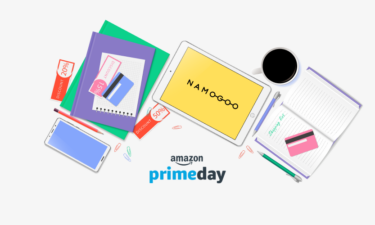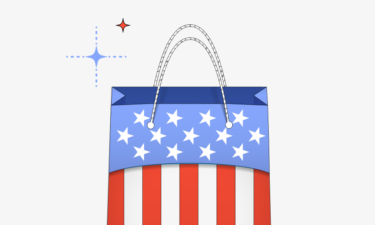Curious about what’s next in the world of eCommerce? We reached out to eCommerce influencers and asked:
“What do you think will be the biggest eCommerce trend in 2022, and why?”
These influencers did not hold back. From AI technology to personalization, these successful eCommerce experts shared their trends, predictions, and strategies for how to engage shoppers, reach profit goals, and drive eCommerce brand success in the upcoming year.
Take a Closer Look at Their Predictions
1. Dedrick Boyd – CEO, TechSparq
Dedrick Boyd has spent 23 years helping sportswear retail companies reduce inefficiencies and costs and increase revenue. He founded TechSparq in 2007 to help leading global brands create engaging human experiences online by leveraging immersive technology and innovative solutions that increase profitability.
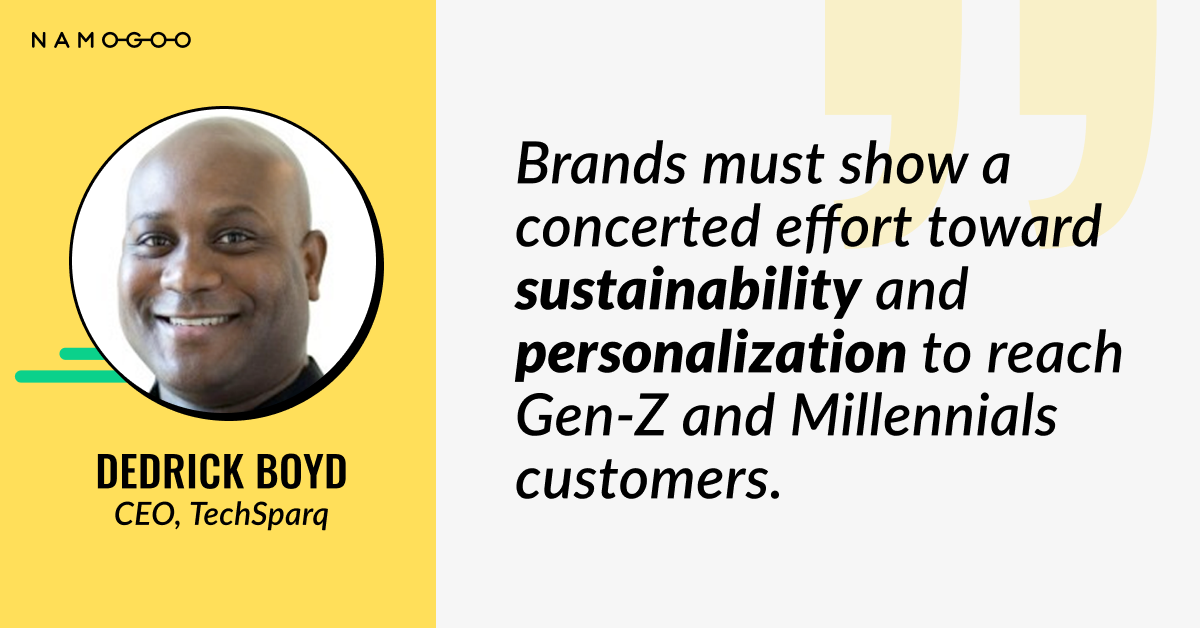
“Brands must show a concerted effort toward sustainability and personalization to reach Gen-Z and Millennials customers. Immersive Commerce allows brands to showcase their sustainability metrics and provide a high degree of personalization by deploying 3D / AR assets to their eCommerce sites. These will be the leaders who reach customers where they are and cement a legacy of success.”
2. Mike Wittenstein – Founder, storyminers
Mike Wittenstein founded storyminers nearly two decades ago to help leaders leverage the power of their leadership story to develop strategies that increase and sustain their competitive advantage. Mike partners with entrepreneurial leaders as a co-thinker to help them articulate their vision, bring their teams on board, and adapt quickly and confidently in a changing world.
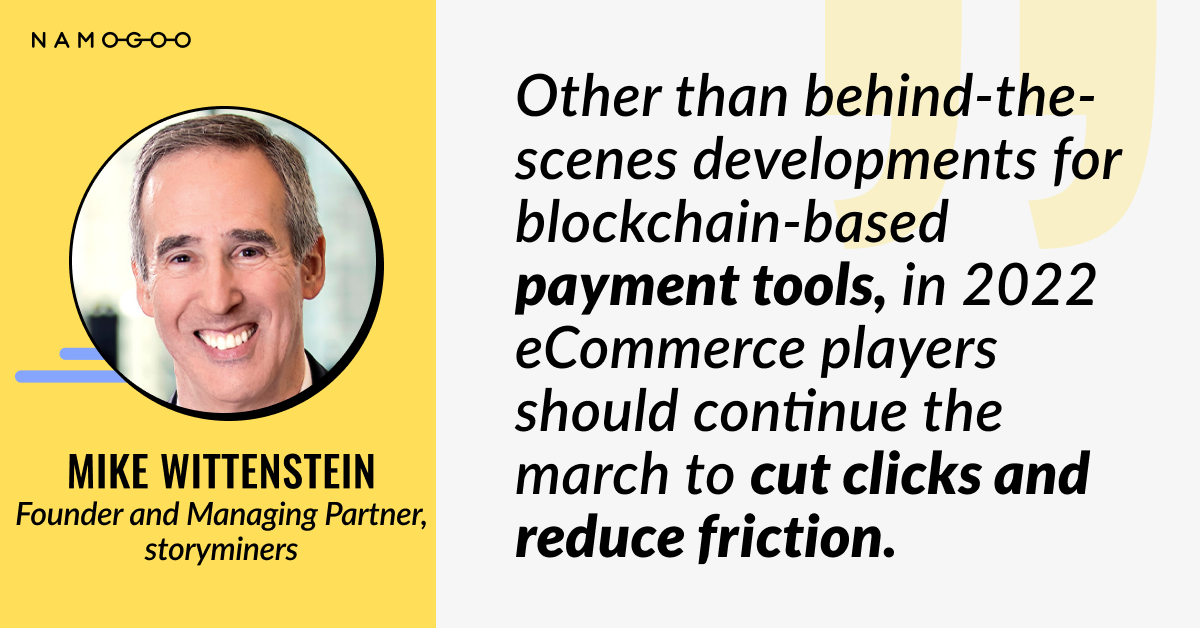
“Other than behind-the-scenes developments for blockchain-based payment tools, in 2022 eCommerce players should continue the march to cut clicks and reduce friction. This includes returns and finding new ways to deliver value for clients (beyond transacting cash for goods and services).”
3. Larry Kim – Founder, MobileMonkey
Larry Kim is the CEO of MobileMonkey, Inc. which works to build the next generation of AI-based Mobile Marketing Solutions through its OmniChat Marketing Platform by connecting with customers on the messaging platforms they use every day. Larry has a history of founding successful companies, as WordStream was acquired by Gannett for $150 million in 2018.
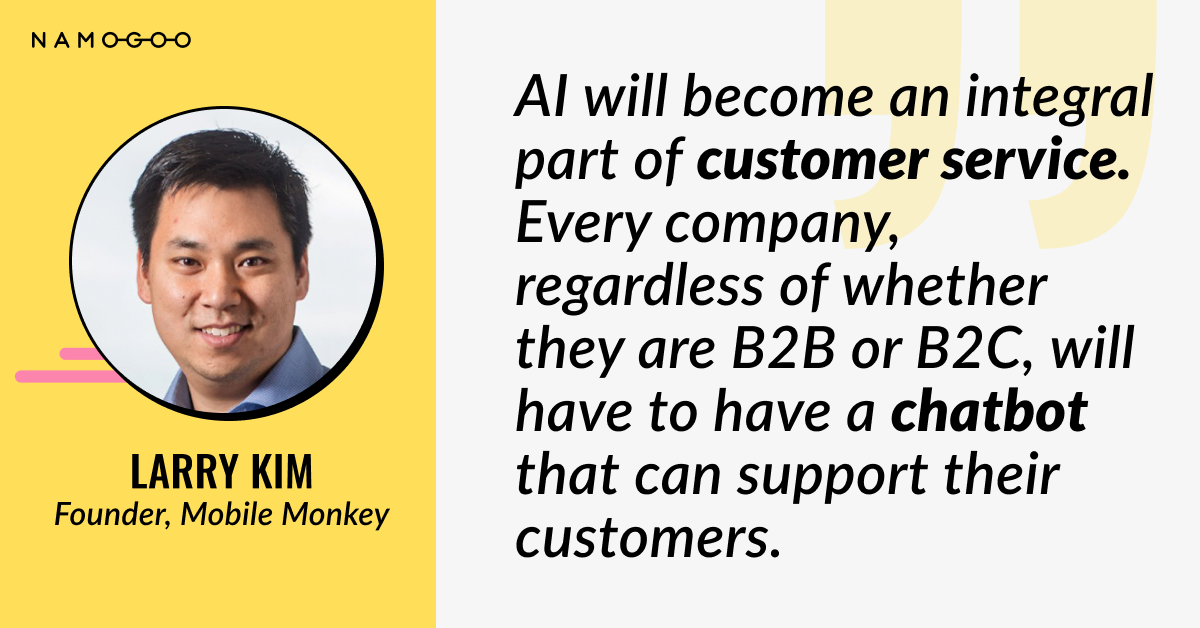
“Marketing automation using chatbots. In 2022, more customers will start purchasing online through social media platforms. The best way for retailers to tap into this growing market is by developing chatbots that can be used on these channels. Marketing automation will also continue to play an increasing role in maximizing conversions.
AI will become an integral part of customer service. Every company, regardless of whether they are B2B or B2C, will have to have a chatbot that can support their customers. Ultimately, I believe that Chatbots with AI capabilities will interpret data and patterns in order to offer more personalized Suggestions.”
4. John W. Hayes – Head of Marketing, Frooition
John W. Hayes has over 18 years of experience in online marketing and eCommerce as a public speaker and content marketing, email marketing, and social media marketing strategist. He is the author of two books: Becoming THE Expert: Enhancing Your Business Reputation through Thought Leadership Marketing and A Crash Course in Email Marketing for Small and Medium-sized Businesses.
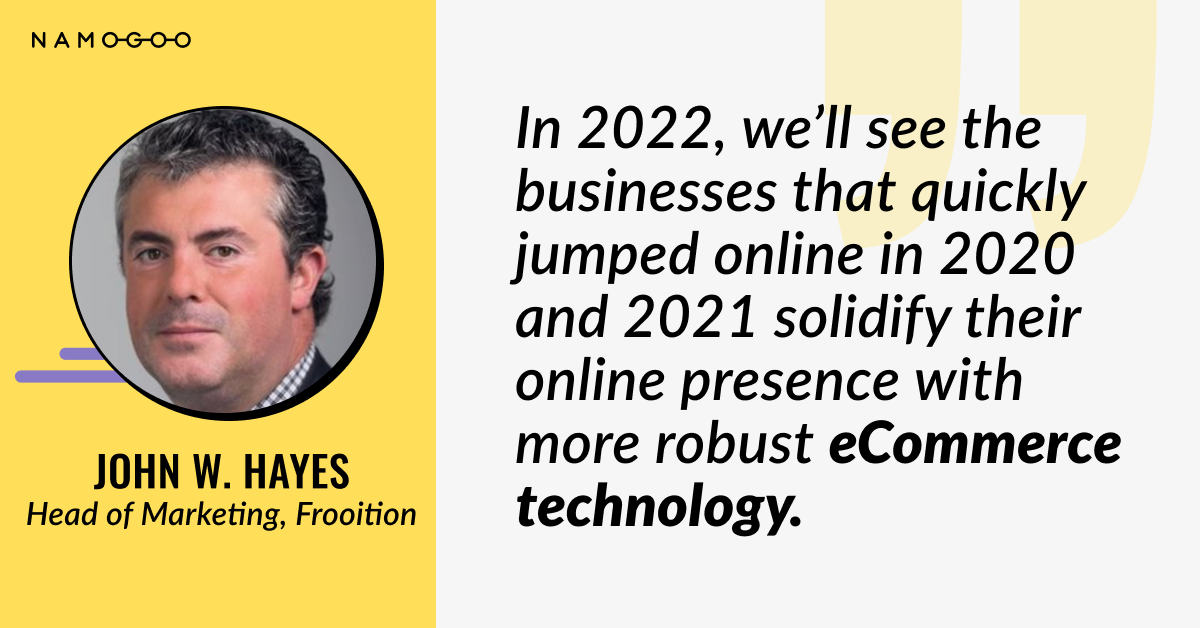
“We’ve seen the lines between online and traditional retail blur over the last two decades. In more recent times, the global pandemic has accelerated this shift to the point where there is literally no such thing as an offline business. In 2022, we’ll see the businesses that quickly jumped online in 2020 and 2021 solidify their online presence with more robust eCommerce technology. This move will mean many businesses change their focus from the online marketplace model (Amazon, eBay, Etsy, etc.), with its low barriers to entry and high cost of sale, in favor of an own store experience. We can also expect to see social media driving more engagement and sales. It’s important to remember that social media isn’t a new technology. Many of these platforms are in the mid-teens now, and as such, we can expect to see them mature into incredibly powerful marketing channels.”
5. Nathan Hirsch – CEO, EcomBalance
Nathan Hirsh builds businesses that help eCommerce Sellers. At EcomBalance, he offers a monthly bookkeeping and analysis service for eCommerce businesses. He is committed to helping his clients by providing financial advice as they grow.
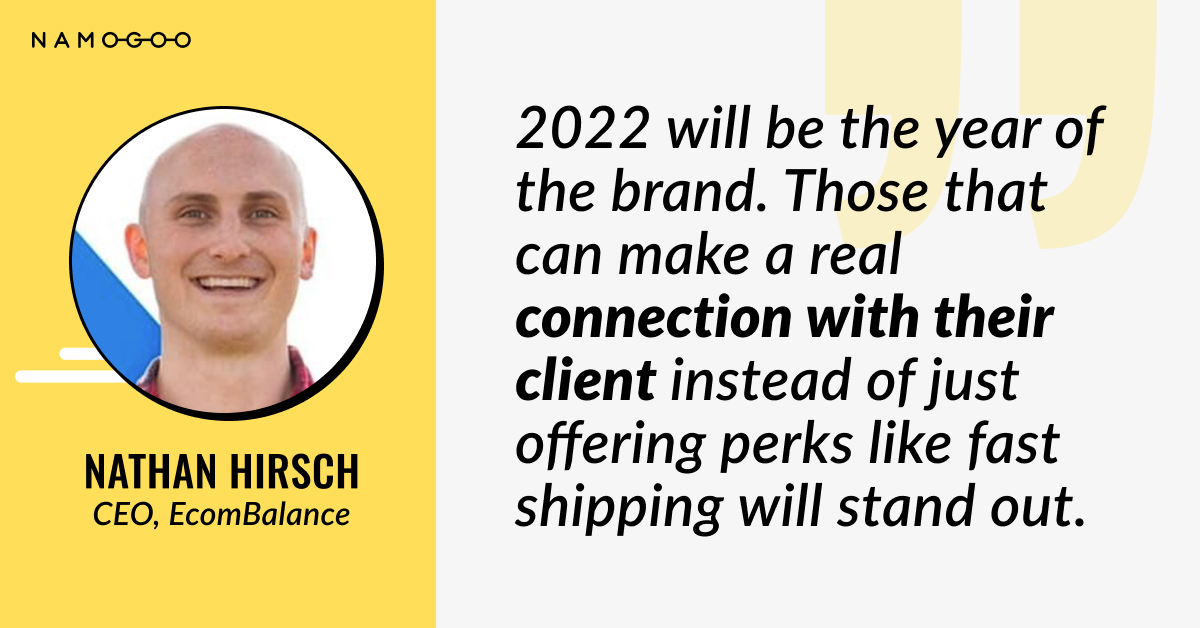
“2022 will be the year of the brand. Those that can make a real connection with their client instead of just offering perks like fast shipping will stand out.”
6. Shep Hyken – Customer Experience Expert
Shep Hyken leverages nearly four decades of experience at Shepard Presentations, working with companies and organizations that want to create amazing customer service experiences for their customers and employees. In 2021, he published the book, I’ll Be Back: How to Get Customers to Come Back Again and Again.
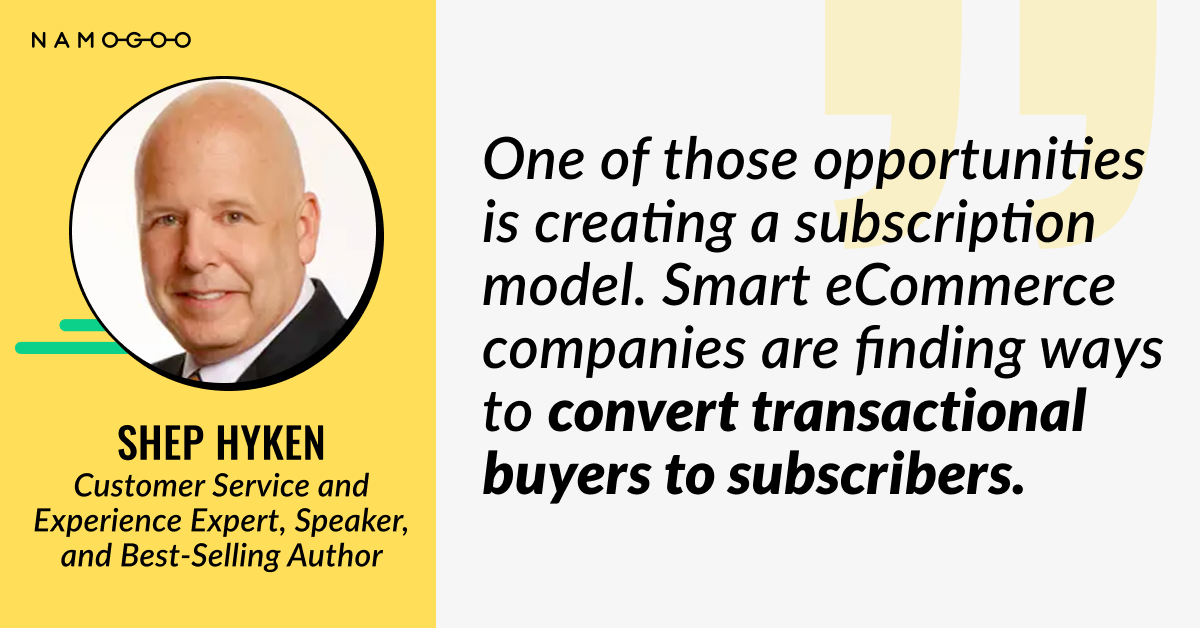
“The pandemic caused customers to develop new habits and expectations, creating new opportunities for almost any type of business. One of those opportunities is creating a subscription model. Smart eCommerce companies are finding ways to convert transactional buyers to subscribers. While this provides a steady stream of predictable revenue for the company/brand, it also creates a convenient experience for the customer when what they are going to buy anyway ‘just shows up.’”
7. Monica Sharma-Patnekar – eCommerce Consultant
Monica Sharma-Patnekar brings over 16 years of global experience building brands as a digital brand, marketing and strategy professional. She’s worked with Fortune 500 companies across brand management, strategy consulting, and global marketing. Monica offers coaching and mentorship to small businesses, and eCommerce and product entrepreneurs on Shopify. Find out more tips.
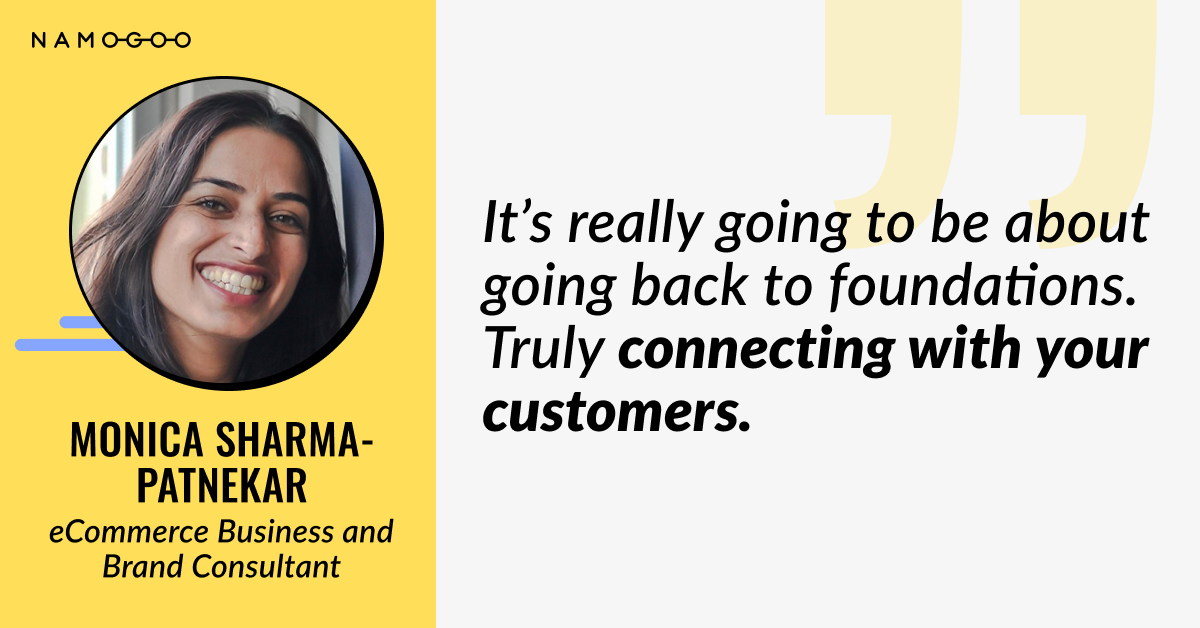
“Biggest eCommerce trend in 2022? It’s really going to be about going back to foundations. Truly connecting with your customers. The ones that are going to excel are all about creating that brand, basically answering the question — “who is my customer and why do they buy from me”? And building off of that – that strong connections and relationships with their customers.
Why? The pandemic initially saw a huge jump in eCommerce sales. Unprecedented. You didn’t have a choice but to shop online. So many eCommerce businesses started to see huge uptake in sales – even ones that struggled before. Towards the end of last year, despite many “huge” figures being shared, if you spoke to many smaller eCommerce businesses, there are many who really really felt a decline all round – from engagement to sales. People who even did well in previous years during BFCM and holiday sales, struggled in the second half of 2021. Economies were opening up, people started traveling again and shopping in-person. People were craving connection.
This craving for connection is only stronger this year. I see all the other “trends” that everyone talks about (social commerce, conversational bots, different forms of payment, etc) as tools to build that connection. But it’s the ones that will truly put the effort in knowing who their customers are, why they buy and are able to connect with their customers, that will thrive.”
8. Bryan Kramer – CEO, H2H Companies
Bryan Kramer is an esteemed business strategist who coaches leaders on strategies to increase their performance through his executive coaching company, H2H Companies. As a global keynote speaker, Kramer touches on subjects of how to be human in social media, marketing, and technological age.
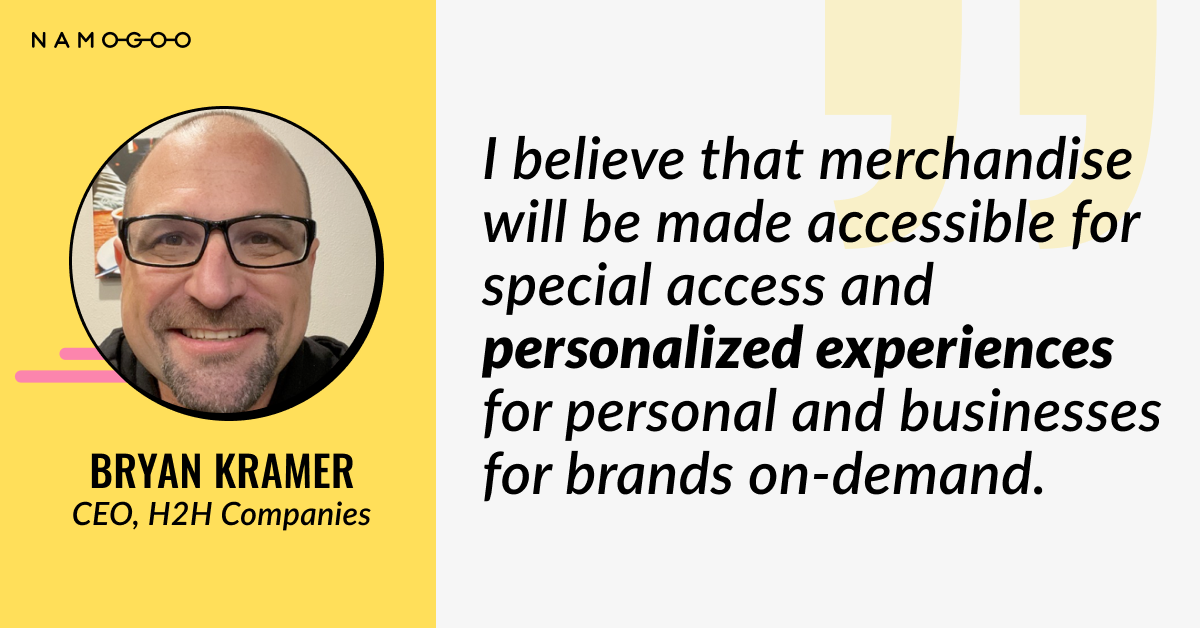
“I believe that merchandise will be made accessible for special access and personalized experiences for personal and businesses for brands on-demand. As well, you will be able to purchase these and other items with your cryptocurrency. This is starting to become evident as Coinbase currently offers a credit card that already makes this possible.”
9. Darko Atijas – Founder, True Altitude
Darko Atjas has significant experience managing international operations, corporate development, and expansion of high growth tech businesses. As the CEO at True Altitude, Atjas works to support the corporate development of digital commerce technology businesses. As a professional investor, he specializes in Digital Commerce, FinTech, and SaaS.
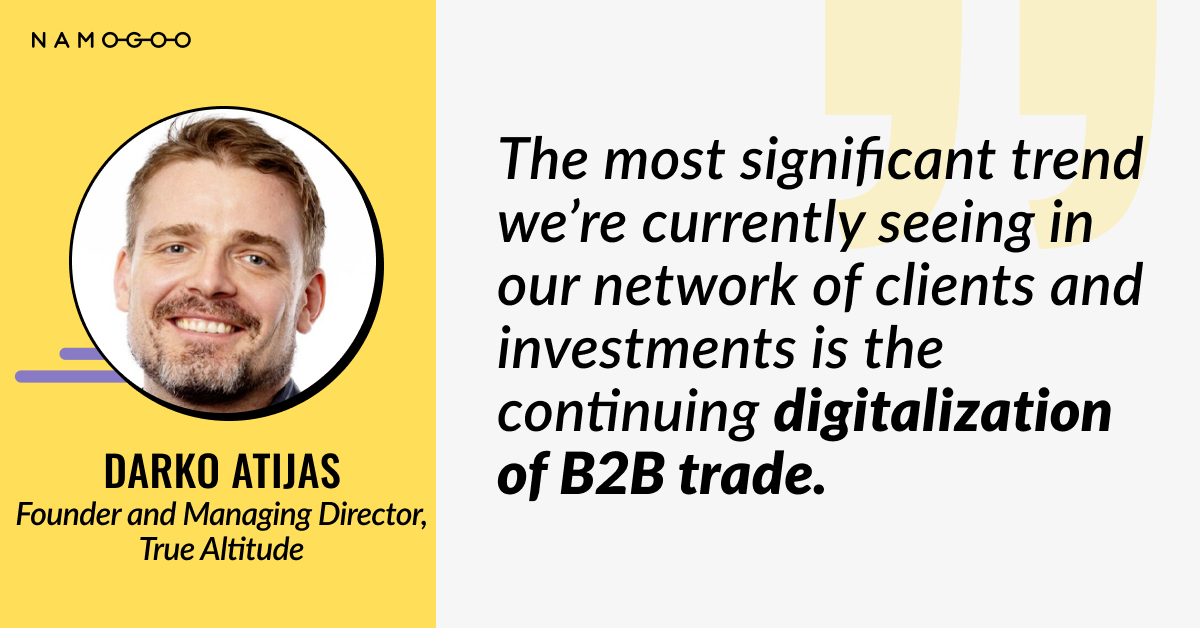
“The most significant trend we’re currently seeing in our network of clients and investments is the continuing digitalization of B2B trade. Traditionally, the vast majority of eCommerce investment has been within the B2C space. This is a $4 trillion opportunity and will disrupt how B2B trade is executed globally.”
10. Branden Moskwa – eCommerce Mentor
Branden Moskwa brings 20 years experience with Start-ups to Fortune 500’s to his work as an eCommerce Mentor and Founder of nadimo. Branden offers unique insights and creative solutions through his boutique eCommerce development firm. Additionally, he is the Founder and Host of the “Original” eCommerce Allstars Podcast.
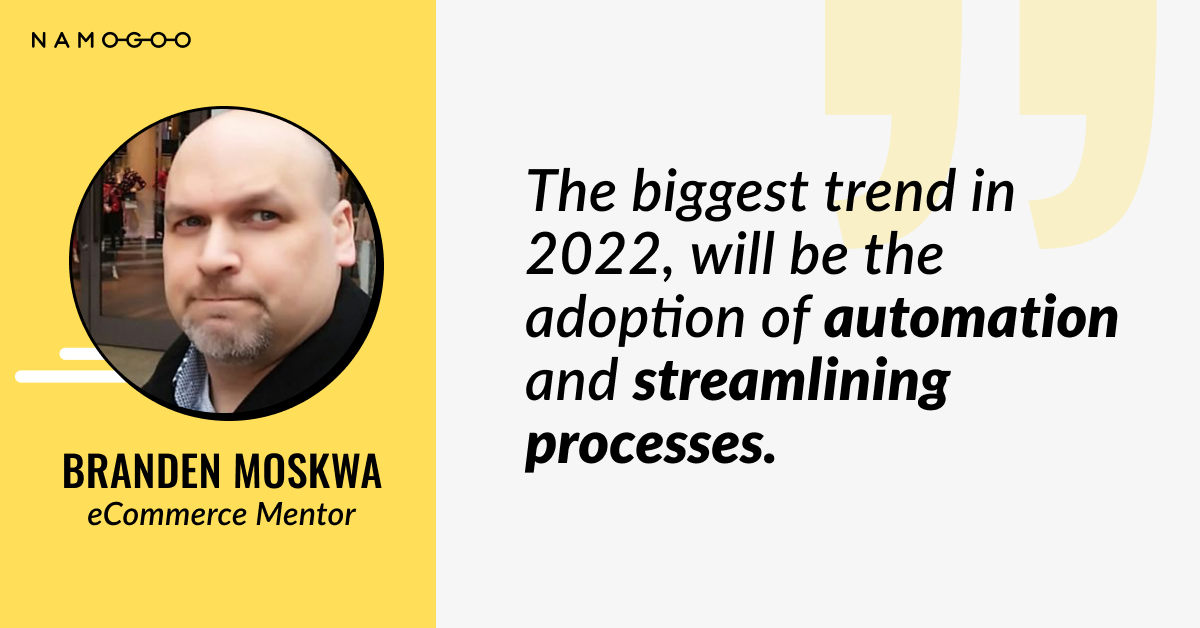
“The biggest trend in 2022, will be the adoption of automation and streamlining processes. There are a few issues that are making this forefront in eCommerce today. Some of which are tighter profit margins, front and back-office disconnects, and issues related to employee retention.”
What do all these Answers Have in Common?
With so many influencers from all corners of the eCommerce world offering their diverse predictions for 2022 trends, you may be wondering, “what is the common message that I can take away from these quotes?”
Customer Experience is at the core of all of these answers. eCommerce innovation and technology cannot simply exist for the sake of existing. There has to be a “why” or a reason behind them. Meaningful connections between shoppers and brands that build loyalty and customer retention can be built through using a variety of tools that these influencers specify, such as marketing automation technology, augmented reality assets, and social media. Tools that contribute to a seamless digital journey and positive customer experience are key for eCommerce business success.
The global pandemic has brought a rise in online shopping and eCommerce sales, innovation, and engagement. 2022 represents a new beginning, one of interconnectedness and intentionality between brands and shoppers.




